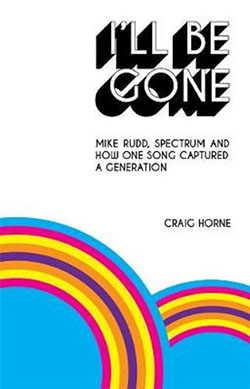 I’ll Be Gone: Mike Rudd, Spectrum and How One Song Captured a Generation
I’ll Be Gone: Mike Rudd, Spectrum and How One Song Captured a Generation
By Craig Horne (
Melbourne Books)
Craig Horne’s biography of New Zealand-born musician Mike Rudd comes with a lofty sub-titular proposition: "How One Song Captured a Generation". That song is Spectrum’s chart-topping 1971 hit, "I’ll Be Gone".
Horne’s biography is a valuable contribution to Australasian musical history. While Rudd’s trajectory as a musician and songwriter is common to many musicians, Horne’s methodical research and oral history charts the highs and lows of Rudd’s career in impressive detail.
Save for a few cursory mentions in John Dix’s chaotic history of New Zealand music, “Stranded in Paradise”, Rudd’s Christchurch r’n’b band, Chants (or Chants R’n’B), the frenetic band whose parochial popularity provided the basis for Rudd’s move across the Tasman in the late 1960s, is largely absent from the pages of musical history.
Rudd’s tenure in Ross Wilson’s Party Machine, covered previously in Horne’s biography of Daddy Cool, is recounted from a more nuanced, Rudd-oriented perspective. Spectrum rises, plateaus, recalibrates and fades away. Ariel teeters on the edge of commercial success, only for the record company to lose interest.
The 1980s is a lost decade, littered with failed attempts to rediscover a creative Zeitgeist now in the hands of a new generation. The decline of Rudd’s wife, Helen, is recounted in heart-wrenching detail and gives rise to arguably the most evocative music of Rudd’s career. The 2000s bring something of a musical redemption, as Rudd revisits and reimagines his creative arc.
Ignoring David Marr’s wise counsel that biographers should stay in the background, Horne crops up as a supporting cast member in Rudd’s story. Horne’s description of his first Spectrum concert is imbued with an almost hagiographic tone. Quotations from other characters in the narrative are ushered in with personal references (“I’ll leave it to my friend to describe”, “As Mike told me”). As Rudd’s life evolves, so too does Horne’s reverence for his subject.
But Horne has a more lofty quest than simple fan-oriented biography: that Spectrum and Mike Rudd are symbolic of a lost era of idealism and optimism. And this is where things go awry. All too often Horne falls into the trap – the Baby Boomer Conceit – of constructing the late 1960s and early 1970s as a dichotomy between the stuffy old establishment and the freedom loving, politically and socially aware younger generation.
This, of course, is the same progressive and enlightened generation that, decades later, gave Australian negative gearing, franking credits and the self-indulgent suffocating, public discourse deconstructed in Mark Davis’s “Gangland”. More recently, members of the same generation that decried the over-reach of the state have been amongst the staunchest – and most pious – apologists for escalating draconian law enforcement powers to tackle a complex and thorny public health issue.
Segues into the Whitlam dismissal and the rise of neoliberal political economy in the 1980s add little to the story; the descriptions also reduce complicated legal, economic and social matters to simplistic and adversarial ideological debate. The reciting of specific external events, such as the marriage of the glamorous Sonia Hopkins to the allegedly homosexual Australian Prime Minister Billy McMahon, is little more than non sequitur (and salacious) historical trivia.
The language veers between folksy and clumsy (London was not “literally” under siege in 1974; it may have been figuratively under siege). Horne’s gratuitous assertion that “music is no longer and important contributor to our broad cultural understanding of ourselves” is absolute nonsense (I was waiting for the inevitable dismissal of identity politics and cancel culture). A more rigorous editorial process would have both refined refined the linguistic style and weeded out some of the more superfluous historical associations (such as the befuddling link between Rudd and Marc Bolan).
Ultimately, beyond his own subjective fan experience, Horne’s ambitious proposition remains unproven. Mike Rudd is a talented songwriter and musician and a thoroughly decent human being. But as enduring as it is, “I’ll Be Gone” no more captured a generation than The Easybeats’ hedonistic “Friday On My Mind”, Russell Morris’s psychedelic “The Real Thing”, the latter-day Masters Apprentices’ soppy-prog ”It’s Because I Love You” and a host of others (at a pinch, I could also make a pitch for Sherbet’s “Howzat”, but that’s another story).
Music is always a product of the social, economic and political environment in which it is created and produced. Baby boomers didn’t invent music as a social movement and it’s time to let go of the mythology. Just enjoy Mike Rudd’s music for what it was, and always will be.

